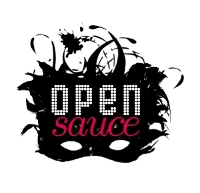

Open Sauce Featured Writer Sophielle discusses the Open Sauce project with facilitator Nor, in this conversation held in an online chatroom on 28 March 2011.
They discuss how the project has evolved so far, as well as critially examining how it relates to queer and feminist theories of writing.
The scene: Wireclub.com
Welcome to the chat room, Sophielle and Nor. This is a FREE-SPEECH room. If you are easily offended you should not be here!
Lasophielle (New Member) joined the room
Lasophielle: Hi. Well, I'm Sophielle. According to my Twitter profile I'm a "scribbler. queer. anarchorevolutionary. dancer. cyborg." I know you, Nor, the creator of Open Sauce, and I've entered into the project more intimately as a kind of 'featured writer' and hopefully, too, a future collaborator in the different forms it will take.
So to me, Open Sauce is a new, challenging sex-positive scribbling wall and activist project. Open Sauce is a Mills & Boon based mosaic under creative attack from all sides. Open Sauce is where you come to read and participate in the making of collective porn. Would you quibble with any of that?
Nor: No, I think that's a good introduction! Though I know the project means different things for different people.
Open Sauce grew out of my interest in free culture and copyright - or, more specifically, copyleft. I wanted to investigate the erotic dimension of the idea of the 'remix', and of releasing work under open source licenses. There is something about the blending and appropriation involved in this process which is erotic to me. I wanted to see if a text which is 'erotic' in the traditional sense could also be made erotic in this more particular sense, too.
This eroticism is process-based: the aim is not really to 'improve' the porn, although this is a pretext I've used to make it accessible. (In fact, it pokes fun at this idea of collaborative 'improvement' because it will never work for everyone.) Rather, it highlights the way that people's desires encounter one other, clash and possibly blend harmoniously. The Mills & Boon-style story is a 'ground' for this to happen.
There are also, of course, a wealth of feminist and queer implications in the idea of taking a text and laying it open to alteration & subversion. So I'm interested in your perspective as a feminist and queer writer.
Tiziano (Pinnacle of Awesome Lvl. 10) joined the room Tiziano left the room
Lasophielle: Absolutely. As its name implies, Open Sauce is open source and saucy not only because it deals in sex and fantasy, but because it allows you to write over and modify the fantasies of others. It is a wiki, and it has been constantly evolving since you launched it ... how long ago now?
Nor: It has been live since 14 March 2011 (today is 28th) and so far it has had...
Nor: ...just checking...
Adult Personals - Click here to find a partner near you!
Nor: ...around 17 different edits.
Lasophielle: Right. Actually, I just want to say, as an aside: I'm quite interested in the dynamic of the forum where we're having this conversation. As we've started this dialogue, a user has entered and exited our purpose-built 'room', and I've had an advert for Adult Personals pop up on my screen! So, before we launch in, really, I want to acknowledge our surroundings - we're in quite an exhibitionist environment.
Nor: Yes, it seems an appropriate place to have this conversation.
Lasophielle: I had to tick, as I created the "room" we're inhabiting, a box to determine whether the discussion - which is vetted - should be moderate, dirty, or 'free'. How would you say this virtual space compares to Radical X's Open Sauce wiki?
Nor: Firstly, I think it sums up the current state that the WWW is in, culturally. The idea of filtering, vetting, etc, is becoming more prevalent. For example, people are getting smarter about hiding their profiles on Facebook, etc. And yet there is a paradox there, in that these forums are essentially public - the servers they live on are out of our control, and the software is often closed-source. So there is a strange and delicate balance between this increasingly dated, utopian idea of the web as a 'free for all', and a more controlled environment. And of course, that environment is increasingly facilitated by closed, proprietary software. I hope that Radical X responds to this, and stands in contrast to it.
